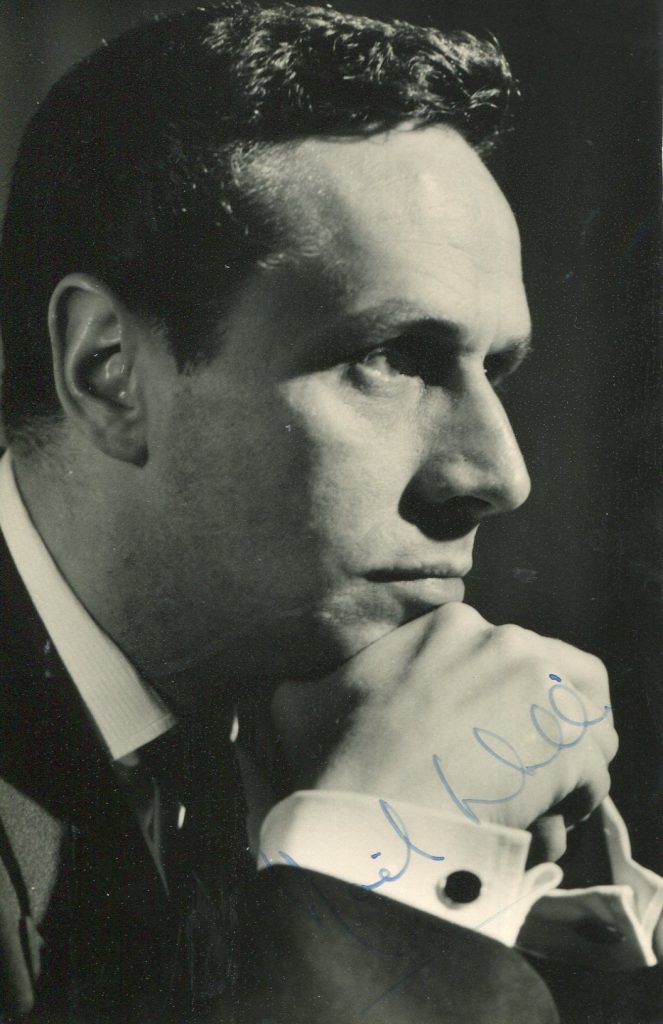
Noel Willman was born in Derry in the North of Ireland in 1918. He made “Androcles and the Lion” in Hollywood in 1953. Other movies include “The Net”, “Carve Her Name With Pride” in 1958, “Doctor Zhivago” in 1965 and “The Odessa File” with Jon Voight in 1974. He directed “A Man For All Seasons on Broadway in 1962. He died in 1988 in New York.
Article from Ulster Biography:
Noel Willman had a most distinguished career which covered every aspect of the acting profession, whether on stage, screen or television, acting, directing, or both at once.
Noel Bath Willman, son of Romain Willmann (sic; he changed the spelling of the family name when Noel was a child), a hairdresser, and Charlotte Ellis Willmann, was born in the city of Derry, studied at the London Theatre School and made his acting debut at the Lyceum Theatre, London in 1939, in Hamlet, directed by John Gielgud in what would be the last production in that theatre for fifty years. During the Second World War and after Willman was mostly active in provincial repertoire theatre, especially in Manchester, where he again appeared in Hamlet with Gielgud in 1944. In 1945-1946 he was at the Bristol Old Vic and in 1948 joined the Royal Shakespeare Company at Stratford where he took some major roles – Antonio inThe Merchant of Venice and Pandarus in The Taming of the Shrew. His Broadway debut came in December 1951 at the Plymouth Theatre in Jean Anouilh’s Legend of Lovers in a cast headed by Richard Burton (this was an English-language translation of the author’s adaptation ofEurydice, first produced in 1942).
Sir Tyrone (“Tony”) Guthrie, the renowned theatre director, encouraged Willman to try directing for the stage. In 1955, after some film work which was hard work but financially beneficial, he took an acting-directing role in All’s Well That Ends Well at the Stratford Festival. For several years he had a cross-ocean existence between London and other English venues, and Broadway, between acting and directing on stage and screen. One (or the) undoubted high point of his whole career came in 1962, when he won a Tony Award in 1962 for his direction of the original Broadway production of double-Oscar winner Robert Bolt’s A Man For All Seasons. Bolt described how Willman was instrumental in many aspects of the play’s development, including the casting of Paul Scofield as Thomas More. The play was first performed on Broadway on 22 November 1961, at the ANTA Playhouse, and was an enormous success, enjoying a run of 620 performances. (Scofield took the same role in the 1966 film and won an Oscar.) In 1966, Willman was again nominated for an Emmy for his production of A Lion In Winter, which featured Christopher Walken, who would later become a leading Hollywood star. (A “Tony” Award is an Antoinette Perry Award for Excellence in Theatre awarded annually for excellence, specifically for productions on Broadway, New York.)
His screen career began in 1952, with the role of Mr Perker in director Noel Langley’s version of The Pickwick Papers; other roles included Lord Byron in Beau Brummell, in a cast including Stewart Granger, Elizabeth Taylor, Peter Ustinov and Robert Morley. Willman was often cast as cold, aggressive authoritarian figures. In Doctor Zhivago, David Lean’s epic based on Boris Pasternak’s novel, he was Razin, the icily intimidating Commissar jointly commanding a group of communist partisans during the Russian Civil War, who kidnap Omar Sharif’s eponymous doctor out of need for a medical officer, ignoring his pleas on behalf of his family. In The Odessa File, he was Beyer, a former SS officer in charge of vetting applicants to join a secret society of former SS members and who is humourless, imperious, and thorough. In Carve Her Name With Pride, he is casted simply as “Interrogator”; the person he interrogates is Violet Szabo (Virginia McKenna), the Anglo-French secret agent who has been captured while operating undercover in Nazi-occupied France. In 1976 he appeared as the Bavarian Minister of the Interior, Bruno Merk, in 21 Hours at Munich, a television film dramatising (accurately enough) the hostage crisis at the Munich Olympics in 1972, when members of the Israeli Olympic squad were taken hostage by terrorists; many were killed.
Noel Willman suffered a heart attack while in a cinema in New York City. He died on the way to hospital.
| Born: | 4 August 1918 |
| Died: | 24 December 1988 |


